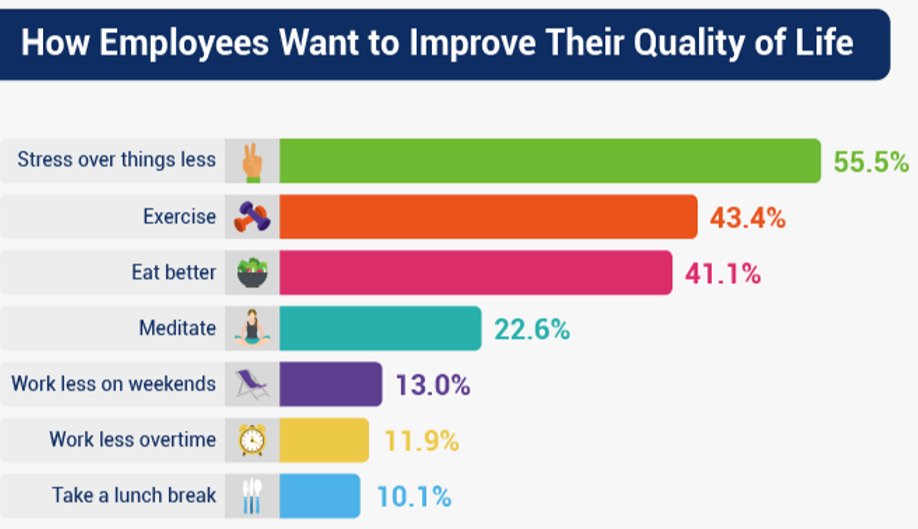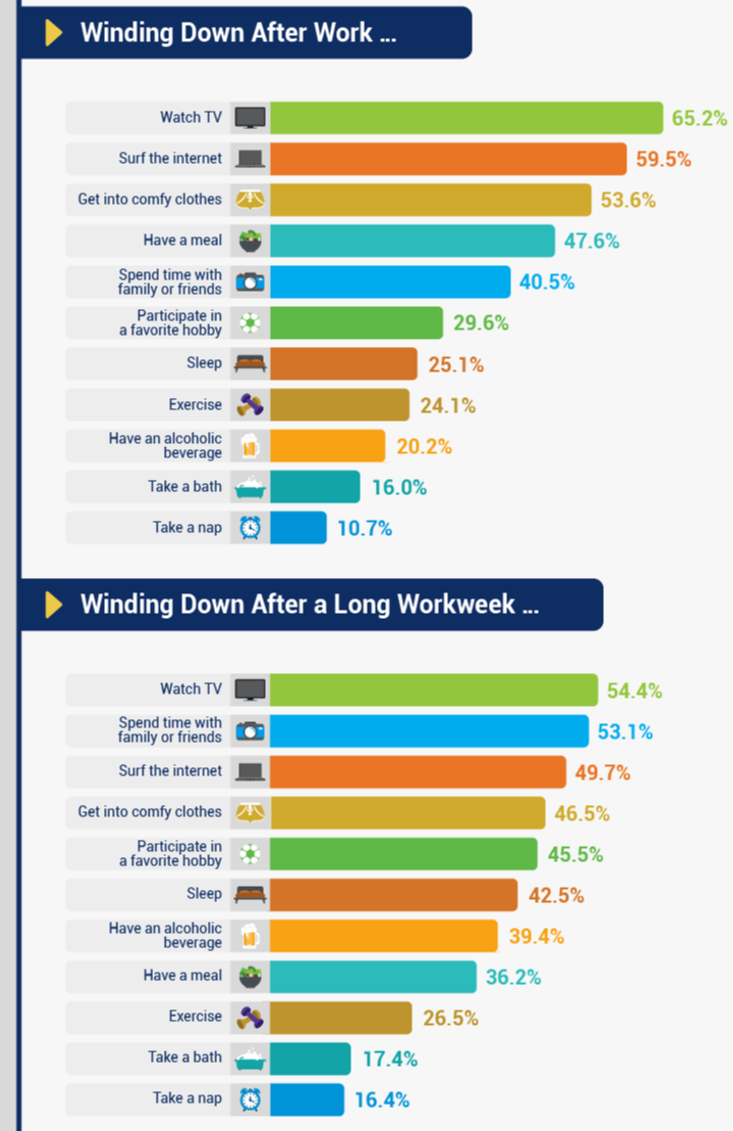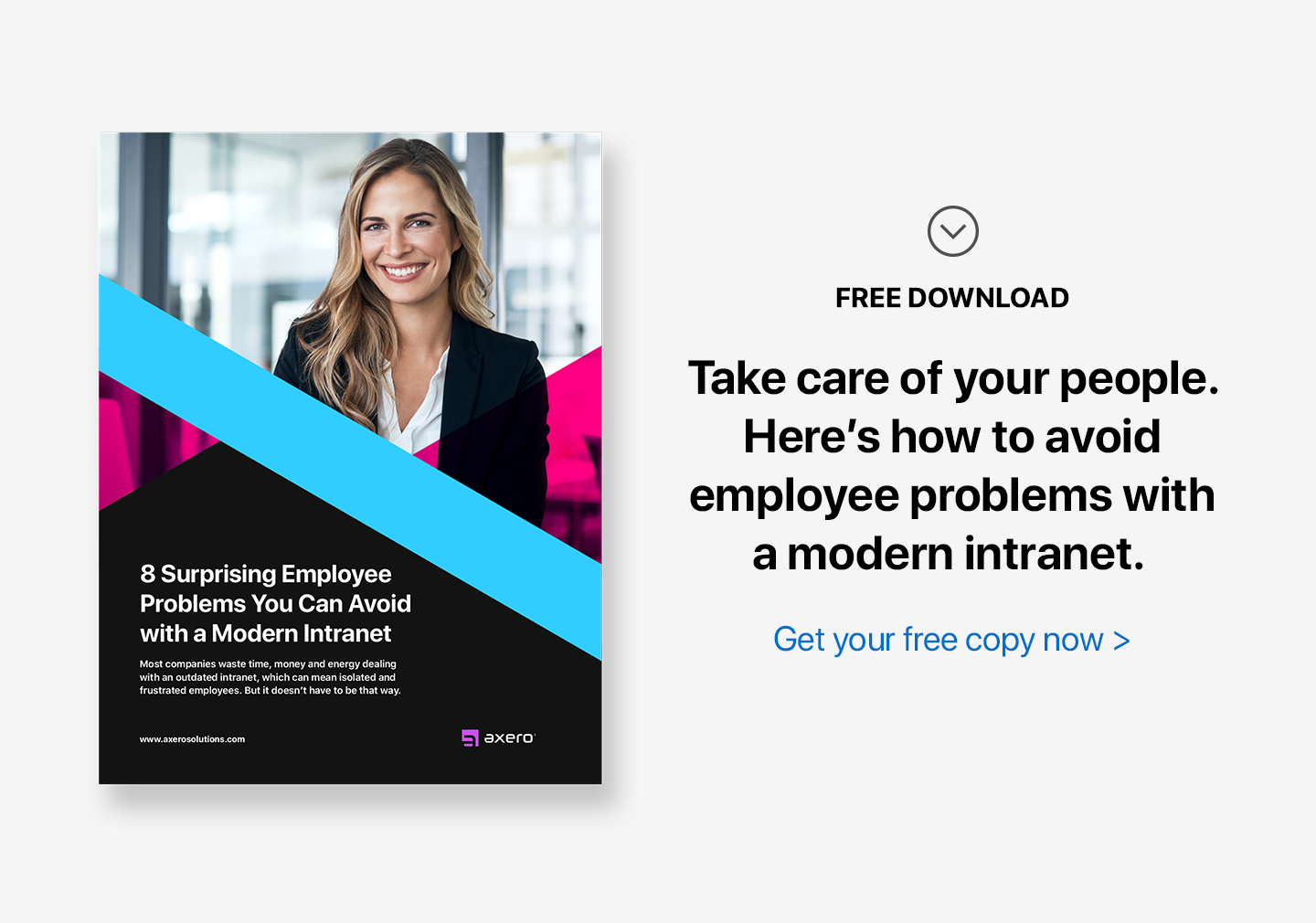
In the last few posts, we’ve been making our way through the list of top workplace stressors. We’re down to number 5: work-life balance. Eight percent of Americans who took the Annual Work Stress survey said it was their biggest source of work-related stress. The percentage is even higher among college-educated Americans and those earning above $50,000 per household.
All these smart and busy folks feel trapped under deadlines, mission-critical tasks, and other demands of their jobs. Instead of feeling proud of their accomplishments, they feel guilty about not spending enough time with their families. What a terrible way to live the best years of your life!
To help ease their pain, I talked to the most work-life balanced individual I know. She is a seventy-seven-year-old trial lawyer, landlord, animal lover, church volunteer… you get the picture. In the three decades I’ve known her, she’s worked anywhere from 40 to 70 hours every week, spent quality time with her family, immediate as well as remote, cooked from scratch, got all her Christmas shopping done in September, never missed a birthday or a graduation—and, most astonishingly, never complained about being busy, stressed, or out of balance.
Want to know how she does it?
She Loves Her Work
No surprises here. Work-life balance is less about how much you work than it is about how much you resent it. People who, by all appearances, have “no life”—dancers, small business owners, TV reporters—never talk about work-life balance. Because nothing makes them feel more alive than doing their jobs every day. Here’s Maureen’s take on it:
“Work-life balance is a biggie with attorneys, but not for me because I don’t think of my work as separate from my life. I am not waiting to finish work so I can live my life. If that were the case, I would have retired a long time ago. What I enjoy the most is writing reply briefs, and I have to be employed as an attorney to do this.“
She’s Good and She Knows It
This is another reminder that work-life balance isn’t simple math. At the end of our workweek—whether 4-hour or 40-plus—we all crave some acknowledgment. A feeling of a job well done can in itself balance the long hours we put into it. But a sense of futility can linger and upset our plans to unplug and recharge.
During her long career, Maureen has earned her share of proud moments. Here’s one:
“You write a reply brief when the other side files a motion, and you need to tell them why they are wrong. Reply briefs are five pages, max, so you have to focus on one or two points and make them stick. It’s not an easy task, but I am good at it. One time I wrote a response to an appeal where I explained why the court was right in the first place and an appeal never should’ve been filed. The attorney who filed the appeal called me and said I was right. That’s about the highest form of acknowledgment you can get, but it doesn’t happen very often.”
She Focuses on the Things She Can Control
A feeling of balance is a feeling of control. If it’s truly your choice to work crazy hours, you’re probably happy with it. But if you chain yourself to your desk in hopes of achieving the impossible, your life and your work will always be at odds. Maureen has learned early in life to choose her battles wisely:
“I liked school as a kid. My home life was chaotic, but school gave me a sense of control. I did my work, and I got straight ‘A’s. I only missed a few exam questions in my whole life, and I still remember most of them. In 8th grade, I got this question: ‘Pilgrims left because there were no jobs in England. True/False?’ I first answered ‘True,’ then I thought it over and changed it to ‘False.’ I figured there must have been some jobs in England. The correct answer was ‘True’.”
She learned her lesson:
“To this day, I don’t like guessing. I am very risk averse. I pick investments that don’t go down with the market. That’s why I own rental properties. My IRA account pays a minimum of 6%. I get a higher return in a bull market, but if there’s a crash, I’m protected.”
I’m not here to tell you how much risk you should carry in your investment portfolio. Those risks are well quantified, and your financial planner can walk you through them. Rather, my point is to pay close attention to the risks and uncertainties of your daily life and work.
Maureen works hard and plays by the rules; she’s no office politician. The most stressful period of her career was a time when she was being forced out of her job because of a power struggle at the top. She also hates losing a case, but taking that risk pays off when she “wins something big.”
Uncertainty equals stress. The better you can answer the big questions of your life and career, the easier it is to work out the logistics. Are you sure of your purpose? Do you trust the people around you? To get through a turbulent patch, we need to believe that the effort is worthwhile, that the system works, and that everything will turn out great in the end. Do you have this conviction? Is there something you need to change to find it?
She Likes Being Busy
If you’re to attempt a juggler’s feat, you might as well enjoy it and let it empower you. Overcoming a challenge starts with welcoming it, and no one is better at taking on a worthwhile challenge than Maureen Taylor:
“During my second year of law school, I joined Law Review. The following year I became executive editor. When I started, we were running almost a year behind schedule: there were 1988 cases in the 1987 issue! Our job was to catch the journal up to date. In 1989 we put out eight issues, instead of four. That took 12-15 hours a week. Add to it 4-5 temp jobs a year—my husband was making all of $12,000 to support a family of four—interviews for a summer clerkship, a full course load, and a few house chores.
I thought I could do it, but only if I stayed hyper-focused. My older son made a weekly schedule for me with something to do every hour from 7 a.m. until 11 p.m. He used to print three copies. I kept one in the Law Review office, another in the tutoring office at the business school where I worked; and the third one I carried around in my notebook at all times.”
Maureen never shows up late or otherwise unprepared. There’s that feeling of control again. But when I asked her if she ever felt rushed, she said: “Sure, I feel rushed whenever I’m working on a task—until I finish it. I hate missing deadlines.”
A busy schedule will create stress in your life, but not necessarily the kind of stress you need to avoid. It could be the exhilarating and addicting stress that floods your brain with dopamine and helps you get better and more confident at your work-life.
She Has to Have Fun
It was no coincidence that my friend thoroughly enjoyed pulling off her superhuman achievements. She only commits to things that spark her interest:
“A lot of law students only take the classes they need to pass the bar. I chose the subjects I wanted to learn—which meant I would have to study tax law on my own . . . I was 44 when I started law school. The dean warned me that I was past the age of pulling all-nighters. But I did just fine, and it didn’t hurt that I liked my classes and enjoyed the assignments.”
Now that her schedule has lightened up, she has fun outside of work, too. She reads novels, keeps up on current events, and takes a big trip at least every other year.
She Doesn’t Really Watch TV
Now we’re getting into the math of balancing demanding work with a satisfying life. It doesn’t leave a lot of room for fillers, like television. Most of us know this, but we don’t act on our knowledge.
In 2017, Paychex surveyed 2,000 full-time US employees to find out how Americans were dealing with work-life stress.
This is what they thought they should do to bring it down:
Source: https://www.paychex.com/articles/human-resources/work-more-stress-less
And this is what they actually did:
Source: https://www.paychex.com/articles/human-resources/work-more-stress-less
Notice how nobody thinks watching TV improves quality of life. So what is the first thing we do when we get home from work? Amazing!
Maureen is no TV Nazi. She owns one or two sets and even turns it on occasionally. However:
“It’s been thirteen years since West Wing went off the air. I haven’t watched a show since then. I would be bored silly sitting for hours in front of a TV.”
She Has Hobbies
Many people, including yours truly, say they have no time for hobbies. We say things like, “day-trading is my hobby.” Or, “fixing my house is my hobby.” Both of those are fine, but they don’t rise to the level of a hobby, because they’re pressure-driven work-like activities. Hence the need for mindless pastimes, like television. While watching TV takes some pressure off, it does little to truly relax us. Paradoxically, doing work for the pure pleasure of it is what gets our minds off the daily grind.
Like many of us, Maureen has a supplemental income scheme. She has bought several houses in her neighborhood, fixed them up, and now rents them to pet owners who would otherwise have few good options. Still, she finds time for hobbies, like painting and playing the piano.
She is Efficient
Okay, this goes without saying. What’s less obvious are the endless possibilities to save time that most of us miss. Not my friend. She can squeeze unnecessary man-hours out of just about anything she does. First, she looks for convenience. For example, she does all her shopping—minus the groceries—online. Next, flexibility. She walks for exercise. Her goal is 10,000 steps a day. She can fit it in around her other activities, so it’s almost like the walking doesn’t take any extra time.
Predictability and reliability are two more ways to save time. For example, all of her tenants are long term. So far, only one has moved out—because she bought her own house. To keep a close relationship with her tenants, Maureen manages all the properties herself. But, thanks to her extremely stable clientele, it takes her less than 10 hours a month!
She is Healthy
Being sick is the biggest waste of time of all. I don’t think Maureen could have accomplished what she did had she not been in excellent health all these years. Her lifestyle has a lot to do with it. Of course, being busy without being stressed is a big part of it, but there’s more. She has been a vegetarian since the age of three. She has never drunk or smoked. She watches her weight and spends a lot of time with animals. She also avoids strenuous sports—something she believes is helping her body last longer: “So many people my age have had replacement surgeries, but my knees and hips still work.”
Work-life balance is a mindset. The sooner you realize it, the sooner you can start living a balanced life. Maureen’s classmates still remember her as “the married valedictorian.” That’s right. She got married at seventeen. When her grade-school principal got the news, she told Maureen she’d never graduate college. Shows how much she knew!
That was back in 1959, before the term “work-life balance” was invented. Much has changed since then to make life easier for working parents and even pet owners. Still, the biggest changes are up to us. If we get them right, we may never stress about work-life balance again. Better yet—we may never want to retire!
______________________________
If you want to balance work and life, you might like my book, because it’s about both.













 info@axerosolutions.com
info@axerosolutions.com 1-855-AXERO-55
1-855-AXERO-55


